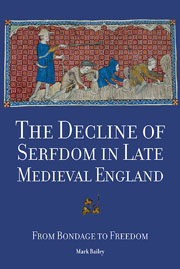Book contents
- Frontmatter
- Contents
- List of Maps
- List of Graphs
- List of Tables
- Acknowledgements
- Abbreviations
- Part I The Decline of Serfdom: Questions and Approaches
- Part II Case Studies
- Part III Conclusions
- 13 The Chronology of the Decline of Serfdom
- 14 From Bondage to Freedom: Towards a Reassessment
- Appendix: List of original sources used in this study
- Chronology
- Bibliography
- Index
14 - From Bondage to Freedom: Towards a Reassessment
from Part III - Conclusions
Published online by Cambridge University Press: 05 March 2014
- Frontmatter
- Contents
- List of Maps
- List of Graphs
- List of Tables
- Acknowledgements
- Abbreviations
- Part I The Decline of Serfdom: Questions and Approaches
- Part II Case Studies
- Part III Conclusions
- 13 The Chronology of the Decline of Serfdom
- 14 From Bondage to Freedom: Towards a Reassessment
- Appendix: List of original sources used in this study
- Chronology
- Bibliography
- Index
Summary
A ‘seigniorial reaction’ and an ‘Indian Summer’, c.1350 to c.1380
The Black Death posed huge economic and social challenges as it moved across Europe between 1347 and 1353, but national and regional responses to it varied. It is widely held that plague had little impact initially on English society, due to two mutually reinforcing developments in the third quarter of the fourteenth century. First, landlords are assumed to have reacted to the shortages of tenants and labourers by re-imposing serfdom through a widespread ‘seigniorial reaction’. Second, landlords also benefited from the unexpected buoyancy of grain prices and rental incomes between c.1355 and c.1375, an ‘Indian Summer’ in which life on the manor continued much as before. As a consequence of both of these developments, the Black Death is considered to have been ‘purgative not toxic’, and real signs of change only become evident from the mid-1370s.
This interpretation fits well with the traditional dating of the decline of serfdom from the 1370s, and it also conforms to an established academic tradition of downplaying the direct and immediate impact of the Black Death. However, neither this chronology nor this interpretation fit the findings of the case studies explored within this book, which point unequivocally to the 1350s and 1360s as the period when villein tenure, and some elements of personal servility, began to retreat decisively.
- Type
- Chapter
- Information
- The Decline of Serfdom in Late Medieval EnglandFrom Bondage to Freedom, pp. 307 - 338Publisher: Boydell & BrewerPrint publication year: 2014



